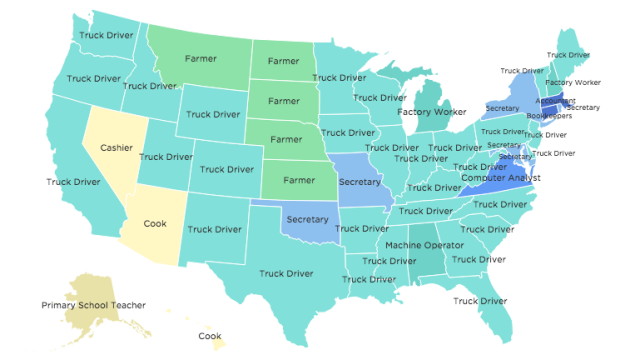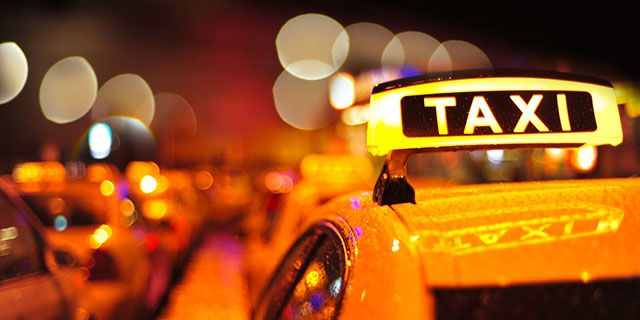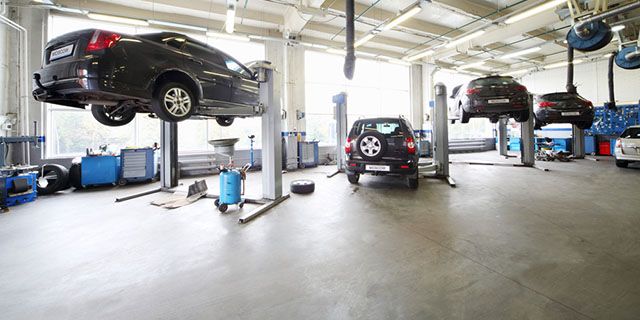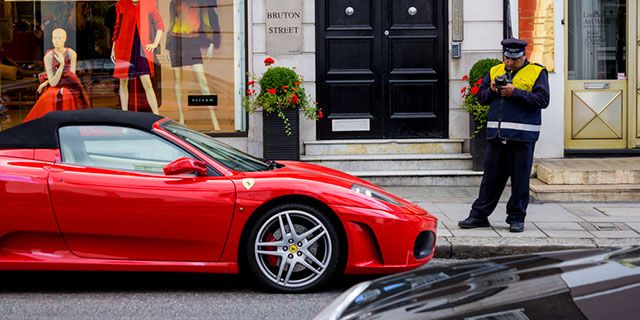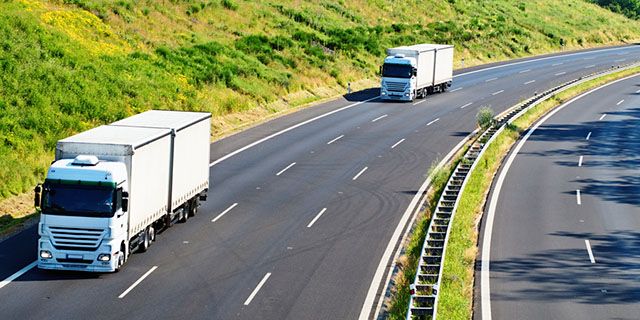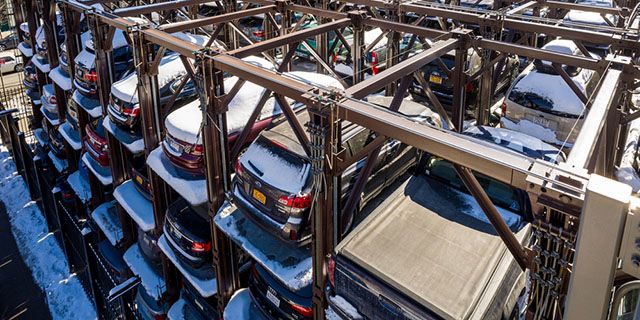The self-driving car is technology's biggest gift to civilization since the birth of the Internet. It'll be a few decades before driverless cars become the norm, but when that day comes, it will be glorious. Robot cars will restore mobility to the young, elderly, and disabled. They'll make travel cheaper and safer. In short, they're going to change the world.
This impending revolution comes with one huge drawback: robot cars are going to destroy a lot of jobs.
With companies like Tesla already pushing for autonomous features as early as this coming summer, the threat against American jobs is immediate. But just how many jobs will be lost? And is this economic loss justified? The answers may surprise you.
Which Jobs Are At Risk, Exactly?
Not long ago, the first self-driving truck was released into the wild. Freightliner's Inspiration, with its ceremonial license plate of AU 010, is the biggest milestone to be hit since the autonomous vehicle discussion began. It's only legal in Nevada at the moment, and it has a human driver as backup, but it's a monumental step just the same.
But the Inspiration is not a good sign for current truck drivers in the United States. Check out this map of the most common profession by state, courtesy of NPR:
That's a LOT of truck drivers. According to the Bureau of Labor Statistics, there were approximately 1.6 million American truck drivers in 2014 earning a mean income of $42,000. That's more than half a percent of the country, and $67 billion dollars in income - about 0.3% of the US GDP.
These new trucks aren't completely autonomous yet, but the technology is going to get there sooner rather than later. And when that day arrives, those truck drivers will need to find something else to do. When you include delivery truck operators, which numbered around 800,000 in 2014, we end up with 2.4 million people who may be out of a job in the next decade or two.
But the bigger topic of conversation when it comes to self-driving cars and their impact? Service drivers. Mainly we're talking about taxi drivers -- and more recently, Uber drivers -- but also included in the conversation are people like bus drivers.
As autonomous vehicle technology improves, it's easy to imagine a world where these vehicles have no need for a human operator. This would leave the following people jobless: 180,000 taxi drivers, 160,000 Uber drivers, 500,000 school bus driver, and 160,000 transit bus drivers, for a grand total of 1 million jobs.
And if we extrapolate a bit and throw in a dash of speculation, we can look at the potential impact on peripheral jobs that don't involve direct driving but do provide services to modern day consumer drivers. For example, auto body repair shops.
While driverless cars are nowhere near perfect in terms of safety, they are undoubtedly safer than the average American driver. Over 6 years of public testing, Google's vehicles have only been in 11 minor accidents, and if Google's reports are trustworthy, none of those accidents were caused by the autonomous vehicle.
A study by McKinsey & Company predicts that, in a future where all cars are driverless, we could see a crash rate reduction of up to 90 percent. Lower accident rates would lead to less frequent visits to auto body repair shops, and that would leave a good portion of the 445,000 auto body repairers without a job.
Other peripherally-impacted jobs could include street meter maids, parking lot attendants, gas station attendants, rental car agencies, and more. Not all of these would lose their jobs entirely, but it's hard to imagine that these industries wouldn't be drastically affected, which could affect up to 220,000 more workers.
In total, that's a little over 4 million American jobs put at risk due to the coming revolution in self-driving cars - more than 1% of the country. Do note that this change will tend result in reemployment rather than unemployment, leading to an overall boost in economic productivity, provided the economy continues to expand.
The Economic Benefits of Self-Driving Cars
Now that we've determined how many potential jobs are at risk, let's look at the potential benefits that we can enjoy once autonomous cars become the norm. Will these benefits justify those lost jobs? I'll illustrate what we stand to gain, but only you can decide whether the trade will be worth it.
As mentioned earlier, the McKinsey prediction is that a society of self-driving cars could see a reduction in crash rates up to 90 percent. For the individual, this means less money spent on car repairs, maintenance, and health bills related to automotive accidents -- which is estimated to be around $180 billion per year.
On a wider scale, we get fewer accidents when transporting cargo over long distances, so companies save money on lost goods. There's also a slight safety increase since fuel tankers and other volatile vehicles are less prone to crash and burn, but admittedly the gains here may not be significant.
Going back to individual benefits, many regions might move away from the "one car per person" mentality that we currently possess, especially in urban environments. Imagine this: whenever you need a car, you open an app and request one, and it's there in a few minutes. Uber is already faster than an ambulance in cities like London. Robot cars can probably get that number smaller. When you get to your destination, there's no need to find parking - the car simply drives away.
Without needing to own our own vehicles anymore, we'd save on gas, maintenance, parking, and insurance costs.
More remarkably, imagine a scenario in which all of these cars were hooked into a singular network. In essence, cars would talk to one another wirelessly as they traveled, and this kind of hivemind would be a huge step towards more efficient driving. People going to the same places could be pooled, sending buses along popular routes, and smart-cars for one-off trips. Electric cars could be used more easily, since they could charge themselves without needing to inconvenience a person. All of this amounts to huge savings. Using autonomous vehicles could wind up costing only a few cents per mile.
A practical example of this kind of hivemind network would be the case of inner city parking. In places like New York, it's almost impossible to find parking because we all want to park as close to our destination as possible. With autonomous cars, that's no longer necessary. The car can immediately go help someone else when you're done with it. No more waiting around depreciating and using up space. How many hours of your life have been wasted in search of a place to park? Now you can arrive at your destination, step out, and go on with your day - the car will do the same.
Another practical example of the automotive hivemind: traffic efficiency. Did you know that your vehicle's fuel economy rating is based on optimal conditions? If you aren't driving like a perfect robot, you aren't getting anywhere near the fuel economy that you think you are.
For example, the most fuel-efficient way to drive is the "pulse and glide method", which involves a rhythmic alternating between acceleration and coasting. Anything less than that and you're wasting gas. Gas-powered autonomous cars can be programmed with optimal driving behavior, which saves on gas.
But more importantly, optimal driving behavior leads to minimal congestion. Did you know that many traffic jams occur simply due to human inefficiency? Check this out if you don't believe me:
A study by INRIX found that the average American and European driver wastes about 111 hours in gridlock every year. What would you do with an extra 111 hours? With driverless cars, gridlock could be a thing of the past.
What else could we get by cutting humans out of the driving equation?
Perhaps the biggest benefit of the driverless car is that they don't suffer from human flaws. Machines have no need to sleep, which means around-the-clock operation of vehicles, but it also means that they aren't burdened by drowsiness. That's an additional point for the "autonomous cars are safer" column.
Another cost that passes down to the customer: insurance premiums. Insurance rates are calculated based on risk. Since we've already established that driverless cars are significantly safer than the average human driver, insurance costs will plummet. Plus, most of those costs will shift to manufacturers and operators of said cars, leaving us free of that burden.
There are so many more benefits to explore, but I'll end with one that's particularly poignant in light of Tesla's recent advancements in battery technology: the fact that driverless cars are more friendly for the environment.
Most of the aforementioned benefits are about cost savings and gas efficiency: less gridlock, less idling, less searching for parking, and more use of electric vehicles? If we follow that thread, the natural conclusion is that improved efficiency leads to reduced carbon emissions. That's always a good thing.
There are other factors to consider, which you can read about in our defense that autonomous cars are good for the environment.
A New Era Is Around the Corner
The truth is that the advent of a driverless car industry will surely displace more jobs than it will create, but the long-term gains that we'll see as a society far outweigh the short-term growing pains and inconveniences. The economic, environmental, and human benefits are astounding. I truly believe that this is one of the situations where the loss of jobs is a valid sacrifice for the greater good of society.
Would I be singing the same tune if self-writing robots were also on the horizon, threatening my own job? If they offered the same kind of economic value and social benefits as self-driving cars, you bet. Self-driving cars are simply too good to pass up. To learn more, check out how self-driving cars know where they are with SLAM.
Is your job endangered by self-driving cars? How do you think they'll impact the global economy? Do the benefits justify the loss of millions of jobs? Tell us what you think in the comments below!
Image Credits: Delivery Man and Package Via Shutterstock, Most Common Profession Via NPR, Taxi At Night Via Shutterstock, Auto Body Repair Shop Via Shutterstock, Parking Enforcer Via Shutterstock, Trucks On Highway Via Shutterstock, Automated Parking Complex Via Shutterstock, Fuel Gauge Via Shutterstock, Car In Nature Via Shutterstock


